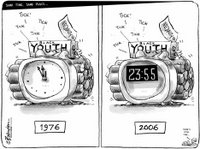The Adventure is Now

Read Mark 6:30-56
The disciples return from what must have been a fascinating and arduous trip around Israel, performing the tasks that Jesus had set for them. Jesus’ sending of the disciples was last week’s reading and it has been on my mind, especially the bit where he tells the disciples that if they are not welcomed into a town, they should wipe the dust from their feet and go on. I’ve spent the past week in Namibia – a very dusty place. I received the most fabulous welcome from the men in Oshakati where I attended a workshop on masculinity. Our adventure in Namibia was wonderful and I have yet to wipe the dust off my boots, which remain scuffed and soiled under my Sunday best!
As with other adventures of this sort, I find I need time to assimilate and make sense of what has happened – I feel the need to retreat and dwell upon its significance. Perhaps the disciples felt the same way on their return, but they are instead plunged into a bizarre situation of having to feed more then five thousand people. My life is a little like that – I seldom have (or take) the time to reflect upon my experience.
Socrates said that the “unexamined life is not worth living.” How true. When our busyness prevents us from living in the present, we are not really living at all.
I found, even on our adventure, I was constantly focused on the future. “When we get there…” I wondered how the workshop would go. At the workshop I was looking forward to the adventure in the desert. In the desert I looked forward to being at home. And now I wonder what happened. Because I wasn’t really there. William, my fellow traveler, had an expression he used a few times on the trip: “The adventure begins now.” I want to live like that – in the now.
I have lived my life with a refrain at the heart of my being: “What is real?” It is has energized all my pursuits. It comes out in some of the stuff I have blogged here about Myth. In a story like the one in our text today, the same question may be asked: Jesus divides a handful of bread and fish into a feast for more than five thousand, he walks on water and heals people. What is real?
Our experience in Namibia taught me a little more about what is real. We got stuck for nearly three days in a river called the Guandegab (which is now a swearword in my dictionary). When they say that 4x4s are a good idea in Namibia, this is a very true saying. A motorbike fairs rather poorly in loose sand. We had to wait through the long hot day for the cool night when the sand is slightly firmer and the bikes could get traction. There was nothing to do, but wait. I couldn’t plan, I couldn’t act. Eventually day-dreaming also ends and one… is. I noticed the lizard nearby dancing his strange press-ups on diagonally opposing feet, so that the feet in the air can cool off. I noticed how still the leaf lies, infrequently gently stirred by a breeze out of nowhere, going nowhere. I was me. I was real. Just a few precious moments, I was present. I was alive.
The disciple’s didn’t get their opportunity to reflect, to rest. They were plunged back into the demanding tasks of compassion. When I returned from Namibia, there has been little opportunity to reflect, to rest. The daily tasks of life pursue me. I remember thinking in the desert, how nice it would be to hold Katie again. I remember how before I went to Namibia, I had been thinking, how nice it will be to have a break from Katie. Constantly living in the future, I had stopped living and am in danger of addiction to a future that never arrives.
The question of reality took a surprising twist when I got home and read Peter Wood’s blog about Velveteen Rabbit - a true story :-) – a favourite of Peter’s and mine. It was a fortuitous stumble. It reminded me that reality is more than just me.
That precious moment of drying out in the desert was not the only me. Me was also back home in Katie and Yvette’s heart. Me was also in the hearts of all my friends and family. Me is also in the heart of my enemy. I am not merely a “skin encapsulated ego” (Alan Watts) but also the being that is part of others, what they know of me, and what we share.
Real is when we stop the hurry of our fast-food life and listen to our souls. But real is also when we stop and love.
So I won’t clean my boots for a while, I like them real…














